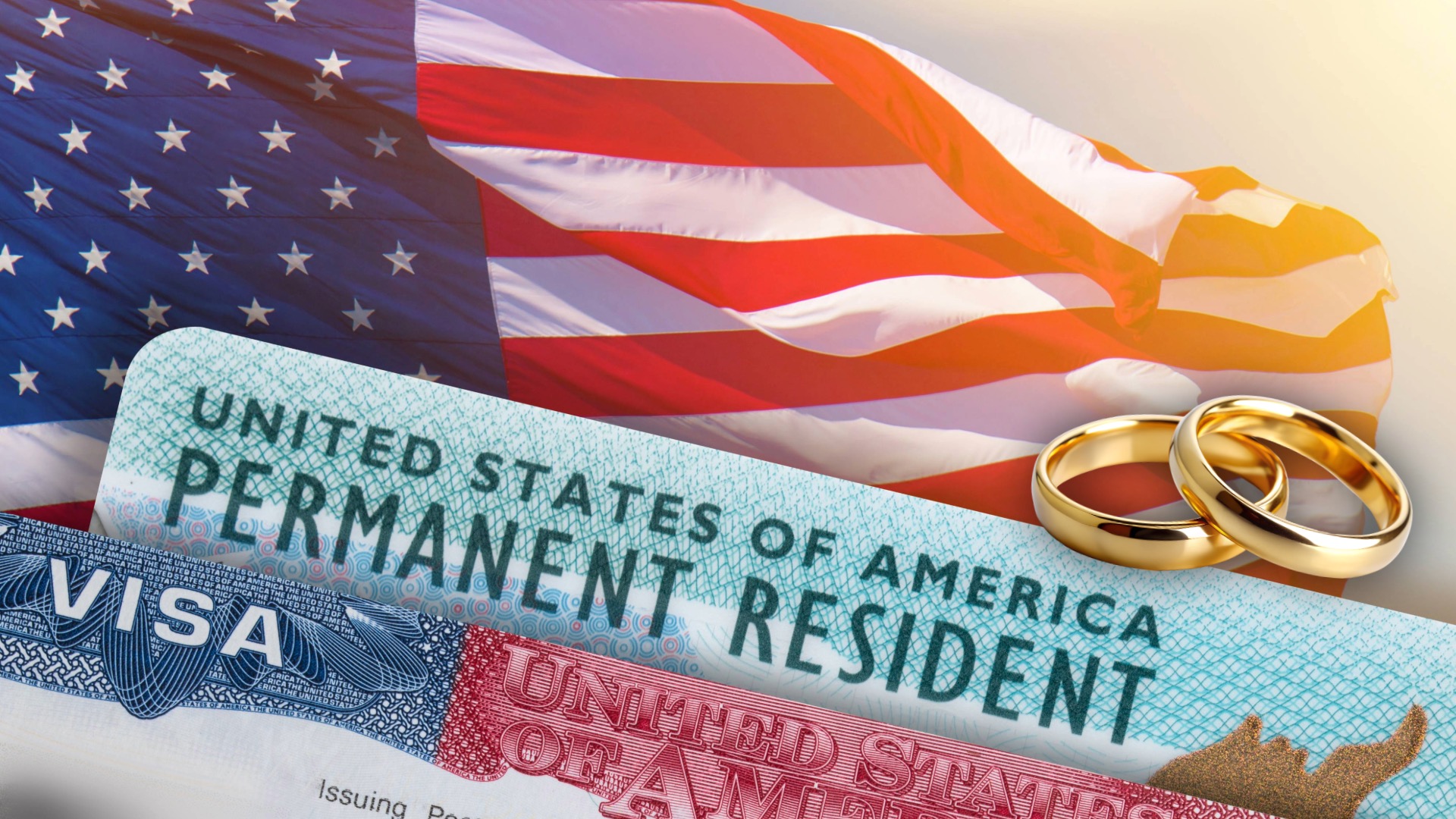
Marriage-based green cards are one of the most common paths to lawful permanent residency in the United States. Under the current 2025 administration the process is more complicated than ever. The U.S. Citizenship and Immigration Services (USCIS) has implemented new policies, form requirements, and stricter procedures that impact every couple planning to file.
At Rozas, we guide couples through this journey every day. If you’re applying for a green card through marriage this year, here’s what you need to know and how to avoid costly delays or rejections.
What Is a Marriage-Based Green Card?
A marriage-based green card allows a foreign national married to a U.S. citizen or lawful permanent resident to apply for permanent residency. The process varies depending on your location. If you’re already in the U.S., you may qualify for adjustment of status. If you’re abroad, you’ll need to go through consular processing.
Adjustment of status means you apply for your green card from inside the U.S. without leaving the country. Consular processing involves applying through a U.S. consulate or embassy in your home country and completing the final interview there. Both paths have their own timelines, documentation requirements, and risks.
Most applicants will submit a series of required forms, including:
- Form I-130 – Petition for Alien Relative
- Form I-485 – Application to Adjust Status (for applicants inside the U.S.)
- Form I-693 – Medical Examination
- Form I-765 – Application for Work Authorization
- Form I-131 – Application for Advance Parole
This process is already complex but as of 2025, USCIS has added more pressure through new requirements and increased enforcement.
USCIS Updates in 2025: What’s Changed and Why It Matters
In early 2025, USCIS quietly implemented sweeping procedural changes affecting nearly every step of the marriage-based green card process. These updates are part of a broader strategy to reduce fraud, eliminate processing errors, and enforce stricter standards on applicants and petitioners alike.
If you’re not working with a skilled immigration attorney, even small mistakes can get your application rejected. Using the wrong form edition or submitting the medical exam late are just a few examples.
Here’s a breakdown of the major updates for 2025 and what they mean for your case.
1. New Form Editions Are Mandatory
USCIS is no longer accepting outdated versions of the most commonly used immigration forms. Each form must be submitted using the exact edition specified by USCIS.
Accepted form editions in 2025:
- Form I-485 (Adjustment of Status) – Only the 01/20/25 edition is valid starting April 3, 2025
- Form I-129F (Fiancé Visa) – Must use the 01/20/25 edition as of May 1, 2025
- Form I-130 (Petition for Alien Relative) – Must use the latest version with updated fraud-prevention language
Why this matters: Even submitting a single outdated page can result in denial. This strict policy leaves no room for error. USCIS does not correct paperwork. Instead, they return it, and you lose valuable time.
At Rozas, we conduct thorough audits of every application before submission, ensuring that the correct forms, versions, and supporting evidence are in place.
2. Increased Filing Costs and Payment Restrictions
In 2025, the financial burden for marriage-based green cards has grown. Alongside higher filing fees, USCIS has introduced stricter rules that can trip up unprepared applicants.
Here’s what’s changed:
- Separate payments required – You can no longer combine filing fees into one check or money order. Each form must be paid for individually.
- Clear declaration of filing path – USCIS now requires applicants to declare whether they’re pursuing adjustment of status or consular processing up front.
- Medical exams must be filed with the initial packet – Submitting Form I-693 separately is no longer allowed in most cases. If your exam isn’t included at the start, your case may be delayed or denied.
Many couples don’t realize these payment and filing errors until they receive a rejection notice. Don’t let that happen to you. Speak with an experienced immigration attorney first.
For more clarity on the difference between filing from within the U.S. versus abroad, visit our Immigration Services page.
2025 Enforcement Trends: Longer Wait Times, More Scrutiny
Beyond paperwork, the tone of immigration enforcement has shifted. USCIS has signaled an intentional crackdown on marriage fraud. That shift means more hurdles for every couple, regardless of whether your relationship is genuine.
Here’s what we’re seeing in 2025:
- Processing delays – It now takes 8 to 14 months to receive work permits and travel documents.
- Increased background checks – USCIS is sharing more data with other federal agencies to verify relationships and applicant histories.
- Surprise site visits – Some applicants report unannounced home visits or being called for second interviews weeks after their initial appointment.
- More RFEs (Requests for Evidence) – If USCIS has even minor doubts about your case, such as discrepancies in dates, missing documentation, or conflicting answers, they may issue a Request for Evidence (RFE). This can delay your case significantly.
These new enforcement patterns reflect a system built on skepticism. Honest couples are paying the price when their application isn’t bulletproof.
Marriage Fraud: A Growing Focus for USCIS
One of the core reasons for these changes is a renewed focus on identifying and preventing fraudulent marriages. In past years, USCIS has reported thousands of marriage fraud investigations. Some involved fake documentation, while others were genuine relationships that simply lacked enough evidence to prove legitimacy.
Red flags for USCIS include:
- Couples who don’t live together
- Large age differences or cultural differences without supporting evidence
- Inconsistent answers during interviews
- Financial records that don’t show joint accounts, leases, or bills
That’s why we help our clients go beyond the basic paperwork. At Rozas, we work with couples to build a strong case, gather strong evidence, and prepare thoroughly for interviews.
What These Changes Mean for You
If you’re planning to marry or are already married to a U.S. citizen or green card holder, these 2025 updates apply directly to your case. Every form must be correct. Every document must be complete. Every answer must be consistent.
Working with an experienced immigration attorney gives you:
- Confidence that your application is built on the most up-to-date forms and requirements
- Support in avoiding common mistakes that can lead to delays, denials, or unnecessary scrutiny
- Guidance in gathering the right documentation, preparing for interviews, and presenting a strong case for your marriage
At Rozas, we work with genuine couples ready to start their life together in the U.S. Our role is to help you navigate the legal process, prepare your evidence, and stand with you every step of the way. Whether you’re applying from inside the U.S. or abroad, we’re here to help make sure your case is thorough, timely, and well-supported.
Final Takeaways: Marriage-Based Green Cards in 2025
Here’s what every couple needs to keep in mind this year:
- USCIS now requires the most recent form editions, older versions will be rejected
- Filing fees are higher, and you must submit separate payments for each form
- Most applicants must include the I-693 medical exam at the time of filing
- Case review has become more detailed, and processing timelines are longer
- USCIS is intensifying efforts to verify the legitimacy of marriages
In 2025, we’re seeing more applicants denied during USCIS interviews. In some cases, individuals are even being detained on the spot. While not every case is at risk, applicants with prior immigration violations, unresolved orders of removal, or criminal records may be vulnerable.
This is not a time to rely on guesswork, social media tips, or incomplete paperwork.
At Rozas, we take the time to review every detail of your case before the interview. If there’s a red flag, we address it early. If you’re eligible, we help you move forward. And if there’s risk involved, we prepare you for it.
Don’t wait until it’s too late. Schedule your Free Consultation with an experienced immigration attorney at Rozas today.
Call Now—Let Rozas Handle the Rest
At Rozas Immigration, we handle marriage-based green card applications every single day. We know the forms. We track policy changes. And we fight for the families we serve with the same dedication we’d give our own.
Call now for a Free Consultation
Don’t wait until a small mistake becomes a major problem. Let Rozas get it right the first time.
Written by David Joseph Rozas
David Rozas is an experienced criminal and immigration lawyer and one of the founding partners of Rozas & Rozas Law Firm. He has been with the firm since 2004, joining his brother, Greg in practice. David concentrates his law practice on criminal defense and immigration.

.svg)















